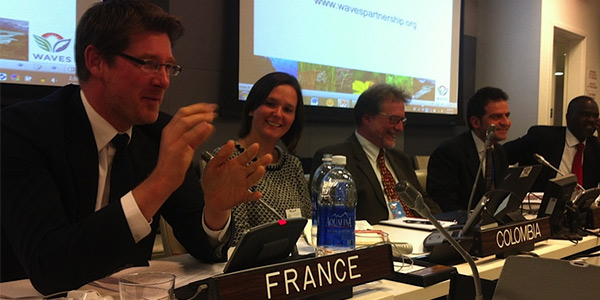At the United Nations in New York, diplomats and negotiators are trying to determine a new development framework that will catalyze economic development while eliminating extreme poverty and promoting shared prosperity and sustainability. As they watch the clock ticking down to December 2015, they are seeking to build upon the Millennium Development Goals (MDGs) to ensure basic human needs and promote growth that is sustainable.
On January 9, Ministers from France and Rwanda were joined by leading technical experts from Colombia, the United Kingdom and the World Bank Group to make the case as to how Natural Capital Accounting (NCA) can contribute to an agreement on the post-2015 Development Agenda by helping countries incorporate natural capital into development priorities.
The meeting took place on the sidelines of the Open Working Group (OWG) on Sustainable Development Goals (SDGs), the UN's principal negotiating forum for drawing up a first draft of the new goals, targets and indicators for international development. The event was opened by Paula Caballero Gomez, Colombia’s representative to the OWG and a key proponent of SDGs during the Rio +20 process. She spoke about how NCA can assist governments to better understand the contribution, value and vulnerability of natural capital.
Stanislas Kamanzi, Rwanda's Natural Resources Minister, laid out why Rwanda has become a Core Implementing Country of the WAVES Partnership. He spoke of the need for action to follow-up on the commitments that governments had made at Rio +20 and the practical promise of NCA to document the contribution of natural capital to economic development and inform policy planning in Rwanda.
Michele Pittini, Senior Economic Adviser and Deputy Director for Evidence and Analysis at the UK's Department for Environment and Rural Affairs spoke of the UK's experience with environmental accounting, the policy relevance of NCA and the challenges of developing accounts. Carolina Urrutia, Senior Adviser to Colombia's Department of Planning, outlined how joining the WAVES partnership is helping the country bring together the complex array of environmental planning and economic institutions.
Sofia Ahlroth, Senior Environmental Economist with the WAVES partnership outlined a host of examples of how natural capital accounts are contributing to sustainable development, linking environment and economy, monitoring and management. She cited examples of national experiences where emission, waste and energy accounts are linked with economic and labor accounts, to inform policy decisions. She also spoke of how NCA is helping develop and refine measures, such as the World Bank’s Adjusted Net Saving indicator, that "goes beyond GDP."
French Development Minister, Pascal Canfin, closed the panel, stating that "it is crucial for politicians to know how useful and valuable natural capital is" when deciding on policies. He explained France's strong support for WAVES' efforts to link NCA to the design and choice of more sustainable environmental and fiscal policies.
Nearly 100 participants including ambassadors, ministers, delegates, and representatives of major groups, including youth and business, participated in the side event. Intervening from the floor, Charles Thembani Ntwaagae, Botswana's Ambassador to the United Nations, shared his country's strong support for NCA.
By the middle of 2014, the UN's Open Working Group on Sustainable Development Goals will have concluded its work, producing a shared vision for common development goals for all countries. The new set of goals, targets and indicators is set to be adopted at a UN Summit in September 2015.
John Matuszak, Head of Global Engagement for the WAVES Partnership, reminded participants that NCA can help countries and the international community to integrate economic and environmental assessment and management, and develop indicators on water, forests, energy, waste, and sustainable production and consumption. He said the UN Secretary-General's High Level Panel on Post-2015 development cited the WAVES partnership as a practical tool for inclusion in the post-2015 development framework.
Agenda for the Workshop (Presentation links are included in the Agenda)

